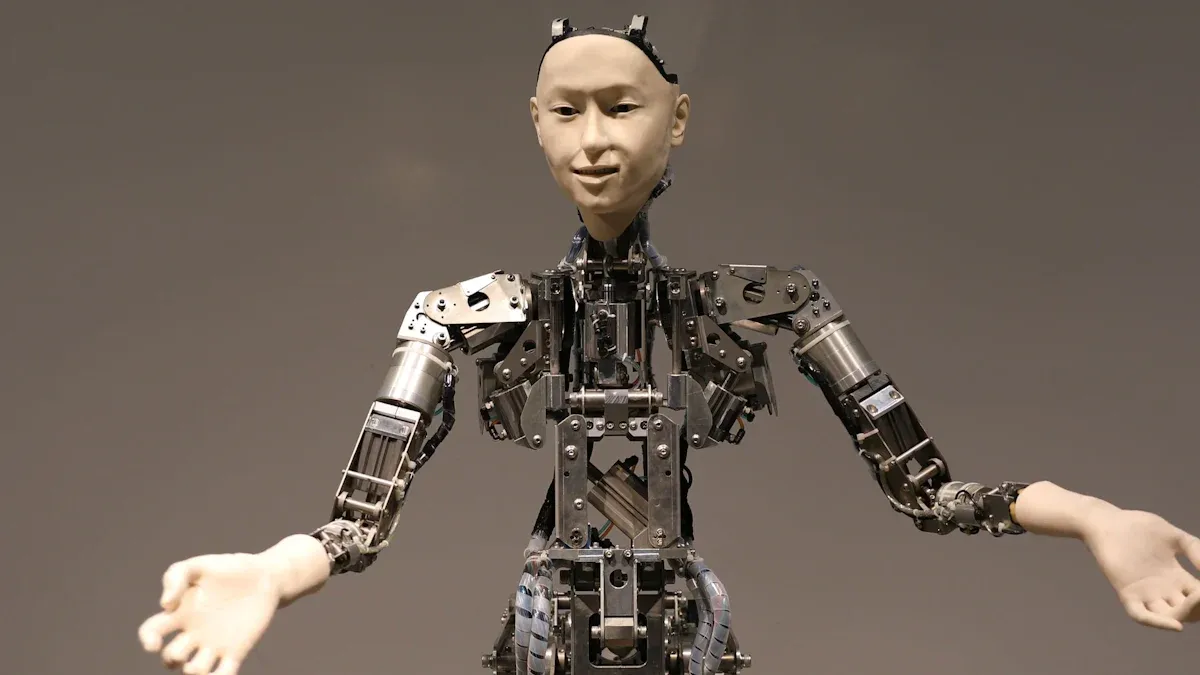Top AI Agent Builder Trends Shaping Business Innovation in 2025

AI agent builders are changing how businesses work and grow. These tools help create smart systems that adjust to users' needs. They also give users unique and personal experiences. The fast growth of the AI market shows their big impact. For example, the AI agents market was worth $3.7 billion in 2023. It is expected to grow to $103.6 billion by 2032. This is a huge yearly growth of 44.9%. This rise shows how agent builders are making industries smarter. They help with better decisions and more automation. Knowing these trends helps you stay ahead in an AI-powered future.
The Growth of AI Agent Builders
From Simple Rules to Smart AI Agents
AI agents have improved a lot since they first started. Early systems followed strict rules and decision paths to work. They could only answer specific inputs, making them stiff and unchanging. Over time, new technology turned these into smart agents that can learn and grow.
Early AI agents copied human talks using set responses.
They worked with fixed rules, so they struggled with hard tasks.
Machine learning helped agents study data, find patterns, and adjust.
Now, modern AI agents are flexible and solve real-world problems better.
Generative AI's Impact on Agent Builders
Generative AI has changed how we make smart systems. It helps create AI agents that talk like humans, making chats feel real. For example, businesses now use tools to build agents that fit their needs. These agents can speak many languages, helping global communication. Also, linking with tools like OpenAI APIs lets agents give smarter answers, making users happier.
Generative AI also saves time by doing boring tasks automatically. This lets people focus on important work, helping businesses stay ahead.
Key Steps in Agent Builder Progress
The history of AI agent builders has big moments. These show how they grew from simple rule-followers to today’s smart agents.
Time Period | Example | Description |
|---|---|---|
1970s | Expert Systems (DENDRAL, MYCIN) | Early systems used rules to help in areas like medicine. |
1990s | Software Agents | Did online tasks, opening doors for smarter AI uses. |
2000s | Machine Learning | Improved business tasks, making agents more useful. |
2010s | Chatbots | Answered customer questions quickly and easily. |
2025 (projected) | Agentic Workflows | Handling daily tasks in fields like healthcare and finance. |

These steps show how AI agents have grown to help businesses today. Knowing these changes can help you get ready for the future of AI.
Key Trends Shaping AI Agent Builders in 2025

Personalization and Context Awareness in AI Agents
Personalization is changing how AI agents talk to users. These agents now remember details to give better answers. For example, they save user preferences and past actions. This helps them respond in ways that feel more human. Context awareness is also very important. AI agents use stored information to match the current situation. They keep track of past chats, making conversations smooth and connected.
These updates make users happier and save time. Think of an AI agent that recalls your past questions and adjusts its advice. This kind of personalization makes users trust the system more. Businesses using these tools can stay ahead in the AI race.
Multimodal AI Integration in Agent Builders
The future of AI agents includes multimodal integration. This means agents can handle inputs like text, pictures, and voice. For example, an AI agent could hear a question, see an image, and give a full answer. This makes interactions more flexible and interesting.
Multimodal AI helps with smarter decisions too. By mixing data from different sources, agents give better answers. Companies using this trend can create better user experiences and solve tough problems. As AI grows, multimodal tools will be key for advanced agents.
Democratization of AI Agent Development
Building AI agents is now easier for everyone. No-code tools let people create AI without tech skills. This helps businesses of all sizes use AI quickly. Special apps also make it simple to set up custom agents.
Industry-specific models are part of this change too. These models help solve unique problems in fields like healthcare. For instance, an AI agent could help schedule patient visits. By making AI easier to use, more people can access it, boosting innovation in many areas.
Human-AI Collaboration in Agent Builders
Working together, humans and AI are changing how businesses use technology. By mixing human ideas with AI's speed, results improve. But for this teamwork to work well, some things need attention:
Humans and AI must communicate clearly to avoid confusion.
Good data management helps AI fit smoothly into tasks.
Fixing AI biases makes it more fair and reliable.
Adding empathy to AI helps it understand people better.
For example, an AI tool can help a customer service team. It handles simple questions, letting humans solve harder problems. This teamwork makes work faster and customers happier. As AI tools improve, working well with humans will stay important for success.
Low-Code and No-Code Platforms for AI Agents
Low-code and no-code tools make building AI agents easier. These tools let people without coding skills create AI systems. This is like other tech trends where users can do more themselves. "Citizen developers" can now design workflows quickly and visually.
Platform | Features |
|---|---|
Microsoft Power Platform | Includes ChatGPT and tools for making custom helpers. |
Mendix | Offers AI tips and fixes with MxAssist Logic Bot. |
OutSystems | Has ready-made AI parts and a ChatGPT connector. |
Mulesoft | Links APIs for real-time AI, like Salesforce's Einstein GPT. |
These tools also make it easier for teams to share ideas. By spending less time on coding details, users can focus on building smart and helpful AI agents.
Real-Time Decision-Making Capabilities
Making decisions instantly is a big deal for AI tools. Businesses now use AI to study data fast and decide quickly. For example:
An investment company improved profits by 12% using AI tools.
A consumer goods company cut out-of-stock issues by 32%.
A finance company solved IT problems 68% faster with AI.
These examples show how AI tools save time and improve accuracy. Using real-time decision-making helps businesses stay ahead and create new ideas.
Specialized AI Agents for Specific Fields
Specialized AI agents are changing specific fields by solving unique problems. These agents focus on certain industries and offer custom solutions. They work better than general systems for specific tasks. This makes them very useful for businesses wanting to stay ahead.
For example, in healthcare, AI helps doctors make better decisions. It studies patient data to improve diagnosis accuracy and save time. In law, AI agents review contracts faster and find issues more easily. These tools show how AI is improving traditional ways of working.
Field | Use Case | Benefits |
|---|---|---|
Healthcare | Helping doctors with decisions | |
Legal | Reviewing contracts | 63% faster reviews, 42% better issue detection |
Engineering | Improving designs | 47% faster development, 18% better performance |
Education | Tutoring students | 0.4 grade improvement, 28% fewer dropouts |
Agriculture | Saving water and fertilizer | 32% less water used, 28% less fertilizer needed |
These "vertical AI agents" are made for specific jobs. They improve efficiency by focusing on what each field needs most. For example, in farming, AI saves water and fertilizer while growing more crops. In schools, tutoring AI helps students learn better and stay interested.
New AI tools make it easier to build these special systems. Agent builders now provide simple ways to create custom AI. By using these tools, you can solve problems in your field and get ready for the future.
Practical Applications and Industry Impacts

AI Agents in Customer Service and Support
AI agents are changing customer service by giving quicker answers. They handle simple questions, so humans can solve harder problems. For example, chatbots work all day and night, helping customers anytime. They also study customer data to give better suggestions, making chats more helpful.
Businesses save time and work better with these tools. In stores, AI agents have made work faster by 31%. This shows how AI is improving customer service, making it easier and more useful.
Supply Chain Optimization with AI Agent Builders
AI tools are improving how supply chains work. They check live data to guess needs, manage stock, and cut waste. For example, AI agents find delays and suggest new delivery paths. This helps goods arrive on time. They also help businesses adjust to market changes with smart tips.
In factories, AI has made work 35% faster. This shows how AI makes supply chains run smoother. Using these tools can help your business stay ahead.
Healthcare Transformation Through AI Agents
AI agents are making healthcare faster and more accurate. For example, they help doctors find hard-to-spot problems 23% better. They also save time by cutting paperwork by 41%, letting doctors focus on patients.
AI tools use patient data to give personal care. They also make medical images clearer, helping doctors find issues faster. These changes show how AI is making healthcare better for everyone.
Financial Services and Risk Management with AI Agents
AI agents are changing how financial services handle risks. They study large amounts of data to find problems and give useful advice. For example, they watch transactions live to spot anything unusual. This quick action helps stop fraud and follow legal rules.
Creating special tools for banks is now easier with AI builders. These tools handle boring tasks like reports and risk checks. By doing this, they reduce mistakes and make decisions more accurate. Predictive tools also help find risks early and stop problems before they happen.
Here’s how AI agents improve risk management:
Benefit | Description |
|---|---|
AI finds risks better and reduces human mistakes. | |
Live Monitoring | Watching transactions nonstop helps catch problems fast. |
More Efficiency | Automating tasks saves time for important work. |
Early Risk Prevention | Predictive tools help stop issues before they grow. |
Stronger Compliance | AI keeps businesses updated on laws, avoiding fines. |
Using these tools helps businesses stay safe and ready for the future.
Enhancing Knowledge Work Productivity
AI agents are making knowledge work faster and easier. They help in areas like customer service and legal research. This lets people focus on important tasks. For example, Salesforce Agentforce cut case-solving time by 40% for a telecom company. It answered questions and updated records on its own.
In law firms, AI speeds up research and writing. It finds useful cases quickly, saving time. In finance, AI studies market trends and automates reports. This gives consultants 15 extra hours each week for planning.
Content creation has also improved a lot. A global company made 300% more marketing content using AI. These tools help with ideas, writing, and organizing tasks. They are now a must-have for creative teams.
AI builders make these tools easy to create for all businesses. By using them, you can work smarter and get ready for the future.
Challenges and Ethical Considerations

Bias and Fairness in AI Agent Builders
AI agents can show unfairness from biased training data. For example, hiring tools may prefer men due to past trends. Facial recognition often makes more mistakes with people of color. These problems happen because datasets lack diversity and miss some groups. This "bias in, bias out" issue keeps unfairness going.
To fix this, use diverse data when building AI agents. Check your AI systems often to find and fix unfair patterns. Adding different data samples can make hiring tools fairer. Testing for fairness helps reduce bias and include everyone. By focusing on fairness, AI agents can make better choices and gain user trust.
Data Privacy and Security Concerns
AI agents need lots of data to work well. But this creates privacy risks. Personal details, like health or money info, could be misused. AI agents also track user actions, which may lead to privacy problems.
To protect data, use strong security tools and update them often. Be clear about how you collect and use data. People should know how their info is handled. Follow rules like GDPR or HIPAA to keep data safe. These steps can protect users and make them trust your AI systems.
Risks of Over-Automation in AI Agents
Too much automation in AI can cause problems. For instance, chatbots have shared harmful advice or private details. In one case, a court blamed a website owner for wrong chatbot info. These examples show the dangers of relying too much on AI.
To avoid this, keep humans involved in key decisions. Set clear rules for who is responsible if things go wrong. Regularly check and test AI agents to stop bad actions, like wrong payments. By mixing automation with human help, you can use AI safely and effectively.
Balancing Autonomy and Human Oversight
It’s important to balance AI independence with human control. AI can do tasks alone but still needs human checks. The level of control depends on the task. For example, a chatbot answering questions might need little supervision. But systems in healthcare or security need more human oversight to avoid mistakes.
Businesses should set clear rules for AI actions. Decide what AI can do alone and when humans must approve. For instance, an AI managing stock shouldn’t make big purchases without approval. This avoids problems and keeps things running smoothly.
Safety measures are also very important. Adding limits, like spending caps or alert rules, keeps AI actions safe. This "trust but check" method lets AI work freely while humans watch key decisions. For example, in banking, AI can flag strange transactions for review. This reduces errors and improves safety.
Working together with AI is another good idea. Let AI handle boring tasks like scheduling or data sorting. Humans can then focus on big decisions. This teamwork makes work faster and smarter. The EU AI Act also says human involvement is needed for risky AI tasks.
By following these steps, you can use AI safely and effectively. As AI tools improve, staying updated will help you use them responsibly in the future.
Strategies for Businesses to Adapt and Use Trends
Hiring and Training for AI Skills
To stay ahead, businesses need skilled AI workers. The fast growth of AI means teams must learn new skills. Updating education and offering special training programs is very important. For example, the AI and Critical Technology Workforce Framework Act helps match education with job needs. These steps ensure your team can use and manage AI tools well.
Training workers is also key to success. By teaching employees how to use AI, they can work better and faster. This also encourages new ideas. Many companies have seen great results by focusing on AI learning. For instance, a top consulting firm saved 15 hours weekly by using AI for research. This shows how training can help businesses get the most from AI.
Creating Flexible AI Systems
Flexible systems are needed to use AI across your business. Moving to the cloud is a smart way to do this. Cloud services make AI tools stronger and more efficient. Good data systems are also important. They help AI give accurate results and work reliably.
Some companies have done well by building flexible AI systems. For example, a telecom company fixed network problems faster with AI. A beauty store improved customer service by training staff with virtual AI helpers. These examples show how flexible systems can improve business tasks.
Task Area | Benefits Achieved |
|---|---|
Automated network checks | Fixed network issues faster and saved time. |
Retail staff training | Boosted product knowledge and customer service with virtual AI helpers. |
Financial checks | Made audits more accurate and quicker. |
By building flexible systems, your business can be ready for AI's future.
Working with AI Tool Experts
Teaming up with AI experts can speed up your AI use. These experts offer tools and advice to help you make custom AI systems. For example, platforms like Momen make it easy to add AI to your apps. They include features like advanced data searches and task automation, helping agents handle tough jobs.
Working with these experts also saves time. You can focus on your business while they handle the tech work. This is helpful for smaller businesses without AI teams. By picking the right partner, you can use the newest AI trends and stay competitive.
Cultivating Innovation and Experimentation
Innovation helps AI agents improve and grow. Trying new ideas often makes AI work better and faster. For example, businesses that focus on innovation see clear benefits:
Tasks take 34.2% less time to finish.
Accuracy improves by 7.7%.
Resources are used 13.6% more efficiently.
These numbers show how testing ideas can make AI systems stronger. Encouraging your team to think creatively keeps your AI tools ahead of others.
You can also use tools like Momen to try advanced features. These include retrieval-augmented generation or multimodal integration. Such tools make it easier to test and add new abilities. By focusing on innovation, your business stays ready for the future and keeps its AI competitive.
Tip: Build a special team to test new AI ideas. This helps find the best solutions for your business.
Navigating Regulatory Changes in AI
AI rules are changing fast. Staying updated is key to following laws and keeping trust. Some recent changes include:
Rule or Guideline | What It Means |
|---|---|
AI medical tools need regular checks and updates. | |
WHO AI guidelines | Focus on being clear, safe, and protecting privacy. |
U.S. proposed laws (2024–2025) | AI in healthcare must be reviewed and explained clearly. |
These rules affect how AI is used, especially in healthcare and finance. Following them can be tricky because of privacy and data rules. But obeying these laws keeps your AI safe and useful.
To adjust, create a plan to follow AI rules. This plan should include regular checks, clear data use, and help from legal experts. Doing this lowers risks and lets you focus on using AI to grow.
Note: Staying ahead of AI rules shows your business cares about fairness and trust.
AI agent builders are changing how businesses improve and grow. These tools help make smart systems that adjust to users' needs. Keeping up with trends helps your business stay competitive with AI. Using AI agents can make work easier and improve customer service. They also help find new chances for success. Making agent builders a key focus can lead to long-term growth. The future will reward those who start today.
FAQ
What are AI agent builders, and how do they work?
AI agent builders are tools that help make smart systems. These systems can do tasks like answering questions or automating jobs. They use machine learning and large language models (LLMs) to study data, understand situations, and give correct answers.
Can small businesses benefit from AI agent builders?
Yes, small businesses can use AI agent builders easily. Tools like Momen help non-technical founders to build full-stack AI-agent based apps. No-code platforms let anyone create custom AI agents without needing tech skills. This saves time and boosts efficiency.
How do AI agents ensure data privacy?
AI agents follow strict rules to keep your data safe. Developers use encryption and follow laws like GDPR or HIPAA. Always pick platforms that are clear about how they handle data. This ensures your personal information stays protected.
Are AI agent builders expensive to implement?
Not always. Many platforms have flexible pricing options. For example, Momen offers affordable plans that grow with your business. You can start small and add more features later. This makes AI tools budget-friendly for everyone.
What industries benefit most from AI agent builders?
AI agent builders help many industries like healthcare, finance, and retail. In healthcare, they help doctors with diagnoses. In finance, they find fraud. Retail stores use them to give customers personalized experiences. These tools solve problems in different fields effectively.
Tip: Check out platforms like Momen to see how AI agents can help your industry.
See Also
Explore 10 Cutting-Edge AI App Development Tools for 2025
The Impact of AI Agents on Startups and Enterprises
12 Strategies for Integrating AI into Your SaaS Offerings
